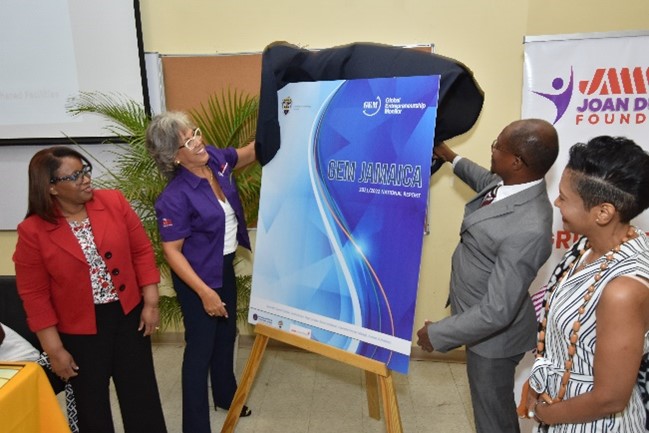Total early-stage Entrepreneurial Activity (TEA) and established businesses have decreased in Jamaica, according to the country’s new National Report authored by the GEM Jamaica Team at the University of Technology, Jamaica. This decline can be attributed to the impact of COVID-19.
However, there is optimism for entrepreneurial activity as there are still some emerging opportunities amidst these challenges. This was a sentiment expressed among a representative sample of 2,300 individuals for the Adult Population Survey (APS) and 39 experts for the National Expert Survey (NES).
The report shows that Jamaica's TEA rate in the 2021/2022 APS was 6.5%, a significant reduction from 9.9% since the previous GEM Jamaica National report was published in 2016/17.
“This decrease may be attributed to the high number of COVID-19 cases that restricted economic activity,” explained Terry-Ann Gaynor Clarke, lead author of the GEM Jamaica 2021/2022 National Report. “The number of established businesses has also decreased to 6.3% this year, compared to 8.2% in the pre-COVID-19 years. However, this figure is not much lower than the global average rate of 6.77%.
The impact of the COVID-19 pandemic on entrepreneurial activity and individuals was significant in Jamaica, with 60% of respondents reporting that the pandemic decreased their incomes. However, 59% of the TEA and 70% of the established businesses agreed that the government response during the pandemic was effective.
Entrepreneurial intention remains low given the effects of the pandemic. Only 27.1% of respondents reported that they intend to start a new business within the next three years, falling below the average rate of 37% for Level C economies. The most significant entrepreneurial motive for doing business by the majority of these entrepreneurs in the TEA category is "to earn a living due to the scarcity of jobs," followed by the "intention to build wealth."
Despite the challenges, there is optimism for entrepreneurial activity as there are still some emerging opportunities. Some experts (58%) agreed that the gig economy has emerged as an important driver for starting up new businesses. However, the report found that not many firms were taking advantage of these opportunities by adopting the gig-based business models.
Socio-demographic analysis results show that the majority of those in the TEA category are within the age range of 25 to 34, with more female (59%) than male (41%) entrepreneurs. The consumer services sector continues to be the most predominant in the TEA (72.3%). Attitudes and perception indicators reveal that most Jamaicans are confident in their abilities to start a business, but there has been a significant decline in the status, respect, and media attention usually afforded to successful entrepreneurs.
More support is needed to increase start-ups in other sectors and make entrepreneurs more resilient, especially when economic conditions change unexpectedly.
A detailed list of policy and practice recommendations is provided at the end of the report. See page 65 of the report.
“Jamaicans are known for their resilience,” concluded Gaynor Clarke. “There can be a positive outlook for entrepreneurship in Jamaica, despite global challenges, if given continued financing, fiscal support, increased education, and commercial and physical infrastructures.”

